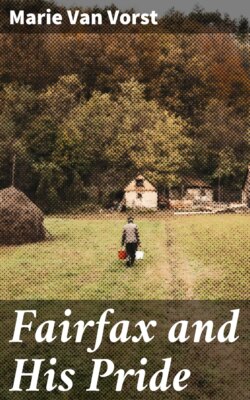Читать книгу Fairfax and His Pride - Marie Van Vorst - Страница 9
На сайте Литреса книга снята с продажи.
CHAPTER V
ОглавлениеTable of Contents
His fortune of twenty-five dollars he divided into five equal packets. His weekly bill with the old ladies, to whom his aunt had begged Antony to go in charity, was to be six dollars. There would of course be extras, car-fare and so forth. With economy—it would last. Antony saw everything on the bright side; youth and talent can only imagine that the best will last for ever. Decidedly, before his money gave out he would have found some suitable employment.
With the summons for supper he flung on his coat, plunged downstairs and into the dining-room, and shone upon his hostesses over their tea and preserves. The new boarder chatted and planned and listened, jovial and kindly, his soul's good-fellowship and sweet temper shedding a radiance in the chill little room. Miss Eulalie Whitcomb was in the sixties, and she fell in love with Antony in a motherly way. Miss Mitty was fifteen years her junior, and she fell in love with Antony as a woman might. Fairfax never knew the poignant ache he caused in that heart, virginal only, cold only because of the prolonged winter of her maidenhood.
That night he heard his aunt's praises sung, and listened, going back with a pang to the picture the family group had made before his home-loving eyes.
Such a marvellous woman, Mr. Fairfax (she must call him Antony if he was to live with them. Miss Mitty couldn't. She must. Well, Mr. Antony then), such a brilliant and executive woman. Mrs. Carew had founded the Women's Exchange for the work of indigent ladies, such a dignified, needed charity.
Miss Mitty knew a little old lady who made fifteen hundred dollars in rag dolls alone.
"Dear me," said Fairfax, "couldn't you pass me off for a niece, Miss Whitcomb? I can make clay figures that will beat rag dolls to bits."
Fifteen hundred dollars! He mused on his aunt's charity.
"And another," murmured Miss Eulalie, "another friend of ours made altogether ten thousand dollars in chicken pies."
"Ah," exclaimed the lodger, "that's even easier to believe. And does my uncle Carew make pies or dolls?"
"He is a pillar of the Church," said his hostess gravely, "a very distinguished gentleman, Mr. Antony. He bowed once to one of us in the street. Which of us was it, sister?"
Not Miss Mitty, at any rate, and she was inclined to think that Mr. Carew had made a mistake, whichever way it had been!
Their lodger listened with more interest when they spoke of the children. The little creatures went to school near the Whitcomb house. Gardiner was always ailing. Miss Mitty used to watch them from her window.
"Bella runs like a deer down the block, you never saw such nimble legs, and her skirts are so short! They should come down, Mr. Antony, and her hair is quite like a wild savage's."
Miss Eulalie had called Bella in once to mend a hole in her stocking "really too bad for school."
"She should have gone into the Women's Exchange," suggested her cousin, "and employed some one who was out of orders for chicken pies or dolls!"
That night, under the gas jet and its blue and ghastly light, Fairfax tried to write to his mother, began his letter and left it as he began. "My dearest Mother. … " She had told him little of his kinspeople, the sisters had never been friends. Nevertheless, he quite understood that, whatever she might have thought of the eccentricities of his uncle, this welcome to her boy would cut her cruelly. She had fully expected him to be a guest at the Carews.
"My dearest Mother. … " He began to draw idly on the page. A spray of jasmine uncurled its leaves beneath his hand. Across his shoulders he felt the coldness of the room where he sat. A few more hurried strokes and Fairfax had indicated on the page before him a child's head—an upturned face. As he rounded the chin, Antony saw that the sketch would be likely to charm him, and he was tired out and cold. He threw down his pen, dragged out his valise, opened it, took out his things and prepared for his first night's rest in the city of his unfriendly kinsmen.
